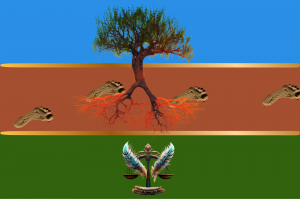Exercising the Rights of Indigenous People to Address Colonialism and Enforce International Treaty Obligations for Peace.
— Jaguar Sun Bai, Chief Justice and Head of Tribal Nation state government
DOVER, DELAWARE, UNITED STATES, January 10, 2024 /EINPresswire.com/ — Marking a historic moment, the Autochthon Kingdom, Delaware Tribal Nation state hosted “Autochthon Kingdom Ceremony: Upholding the Divine Rights of Indigenous People,” which was broadcast live on January 1st, 2024. This seminal event represented a crucial acknowledgment and advocacy for the rights of autochthon indigenous peoples who continue to face over half a millennium of oppression.
The ceremony was a platform for the Autochthon Kingdom Equity Court, the Royal Tribal supreme court of Indian Offenses to assert their judicial authority under universal jurisdiction. It focused on confronting the systemic denial of rights and the history of genocidal violence endured by autochthon indigenous peoples across North, Central, and South America, as well as autochthon indigenous islands including the Caribbean Bay Islands.
This official ceremony not only celebrated the establishment of the 14th Union state but also highlighted the Autochthon Kingdom’s claim to a seat in the Continental Congress, as per the Delaware Treaty of 1787. Attendees were privy to the reading of the Autochthon Kingdom, Delaware Tribal Nation state’s charter, symbolizing a new chapter in their history.
The Autochthon Kingdom Equity Courts proclaimed their judicial authority under universal jurisdiction to confront over 500 years of systemic denial of rights and genocidal violence against autochthon indigenous peoples of North, Central and South America and the Caribbean Bay Islands in an amazing online event featuring Peter Forgina co-founder of the Project Peace Lights, who shared with us the mission to spread “peace education” among all nations including those outlined in the 2063 Africa Peace initiative.
The Official Ceremony initiated to celebrate the establishment of the 14th Union state, and claim to the seat in the Continental Congress promised through the Delaware Treaty 1787, and included the reading of the Autochthon Kingdom, Delaware Tribal Nation state’s charter.
The broadcast featured esteemed Civil Rights Activist Raymond Fauntroy, former director of the Southern Baptist Christian Church, confidant and driver for Martin Luther King Jr., who shed light on King’s intent and purpose of the “I Have a Dream” speech, standing on the mountain top, witnessing the Promised Land, and the exile of the autochthon indigenous people on their own land. Fauntroy affirmed the unity between the messages of Dr. King and Malcolm X who stated, “We did not land on Plymouth Rock, Plymouth Rock landed on us,” Malcolm as well as Martin testified to the indigenous ancestry of the autochthonous people branded “Black” and “African American”.
“This was our time for truth, revelation and reconciliation throughout the Americas, de facto governments cannot remain silent or complicit through inaction. Together we began healing by acknowledging harsh truths and constructing a just future grounded in mutual respect,” stated Chief Justice Jaguar Sun Bai of the Autochthon Kingdom’s Royal Tribal Supreme court of Indian Offenses.
About the Royal Tribal supreme court for Indian Offenses
“We are honored to present the Royal Tribal Supreme Court of Indian Offenses, established through treaty accession to the historic Delaware Treaty of 1878 and the revered Iroquois Constitution ‘Great Law of Peace.’ Our Court, duly registered under the Library of Congress (No. Txu002347364) and U.S. Customs (Recordation No. COP 2300067), is a symbol of justice and advocacy for the Autochthon Indigenous communities.
The Court’s establishment marks a significant stride in acknowledging and addressing the genocides by identity theft, forced assimilation, and racial classification systems that have historically erased autochthon indigenous identities. One of the most pernicious aspects of this historical injustice has been the systematic branding and renaming of the autochthon indigenous peoples, a practice designed to erase cultural identities and histories. This process is evident in the imposition of labels such as ‘Negro,’ ‘Moor,’ ‘Moorish,’ ‘Black,’ ‘Colored,’ ‘Mulatto,’ ‘Indian,’ ‘Mestizos,’ and ‘African American.’ Each of these terms, while seemingly benign, has played a role in the cultural genocide and erosion of the true identity of the Autochthon Indigenous peoples.
Our Court is not merely a judicial body; it is a platform for equitable lawful redress, focused on enforcing treaty obligations and restoring peace. We are dedicated to challenging and rectifying the repercussions of these historical injustices, particularly those related to ethnic cleansing by European colonial regimes in the Western Hemisphere. Recognized as cultural genocide and crimes against humanity under international law, these actions demand a response rooted in justice and historical truth.
The Royal Tribal Supreme Court of Indian Offenses is committed to upholding the divine rights and dignity of the Autochthon Indigenous people, providing a path for the redress of past wrongs, and ensuring the preservation and celebration of our rich cultural heritage.”
The event was gracefully hosted by Honorable Jaguar Sun Bai and Head of Nation Yolanda Yisra’el. Esteemed guests included Chief Tomahawk, Chief Wanag Tahatan Bey, Chief Peace Eagle, Chief Kombrebai, Chief Ajoma, Chief Justice Willie Williams Yahweh, and Chieftess Tia Strongheart of the Bay Islands. The gathering was enriched by the presence of numerous indigenous survivors, descendants, and allies, including delegates from New York, Maryland, the District of Columbia, Virginia, California, Oklahoma, Michigan, Texas, Florida, Honduras, and Illinois. These delegates partook in a ceremonial recognition of the 1787 Delaware Treaty and its amended charter, and initiated investigations and settlements for their grievances.
Mikah Mitsuyahu Black-Eagle, the Associate Dean of the Royal Tribal Supreme Court University, emphatically stated, “The time for justice is now.” He highlighted the legal, moral, and obligatory aspects of addressing issues such as genocide, land theft, human rights violations, treaty nullifications, and systemic brutality against Native communities across the Americas. Dean Ayah Ellis Black-Eagle, overseeing more than 100 students in Law Advocacy, Tribal Marshall, Tribal Notary, Tribal Chaplains, and Court Watchers programs, added, “We are fortunate to have a remarkable team of autochthons working diligently behind the scenes, bringing these significant efforts to fruition.”
The Autochthon Kingdom Royal Supreme Court of Indian Offenses Equity Court, serving as a protector of fundamental principles such as jus soli, jus sanguinis, jus divinum, and jus gentium, underscores the urgent need for the current government to honor and respect treaties. This emphasis is particularly crucial for Autochthon Indigenous nations across the Americas, who are encouraged to exercise the doctrine necessitating the exhaustion of tribal judicial authority, given the lack of suitable equitable remedies within the existing framework.
Each of these principles plays a vital role:
Jus soli (right of soil) refers to the right of anyone born in the territory of a state to nationality or citizenship.
Jus sanguinis (right of blood) is the right of citizenship or nationality based on the nationality or ethnicity of one or both parents.
Jus divinum (divine right) denotes rights that are believed to be granted by a divine power, often implying a historical and spiritual legitimacy.
Jus gentium (law of nations) involves principles and rules that govern the conduct of sovereign states in their relationships with one another.
By focusing on these doctrines, the Autochthon Kingdom emphasizes the importance of utilizing all available tribal equitable pathways to seek justice and address grievances. We urge the responsible authorities to proactively engage in restoring justice and rectifying past injustices without waiting for demands. Failure to act accordingly is not just an oversight but a willful continuation of injustice. Proactive acknowledgment, restoration, and accountability are essential to forge a path toward peaceful and just relations, deeply rooted in mutual respect and understanding.
“In 2024, the Court is committed to broadening its reach and impact by not only formally recording its declarations but also through active participation in public dialogue. This engagement will utilize diverse channels such as specialized programming, informative podcasts, and events, all centered around key areas including peace education, the history of autochthon indigenous peoples, and forums on digital equity. Integral to the Court’s mission is the enforcement of treaty peace obligations, which encompass crucial legal principles as outlined in the provided text:
Abstention from Injury: Every individual is obligated to refrain from harming another person or their property, or infringing upon their rights. This principle forms the foundation of our commitment to non-violence and respect for individual sovereignty.
Fraudulent Deceit: The Court acknowledges the responsibility of individuals and entities who engage in deceitful practices, whether through false statements, suppression of facts, or promises made without the intention of fulfillment. These deceitful practices, especially when intended to defraud the public or a specific group, are recognized as harmful to the entire class affected.
Restoration without Demand: Emphasizing the importance of rectifying wrongs, the Court upholds the principle that things obtained wrongfully must be restored without the need for a demand, especially in cases of mutual mistake or deceit.
Responsibility for Willful Acts and Negligence: The Court maintains that every individual is accountable for the consequences of their willful actions and for any harm caused by their lack of ordinary care or skill. This principle extends to the management of both property and personal conduct.
These principles reinforce our dedication to upholding justice, ensuring the restoration of rights, and addressing grievances in a manner that respects the dignity and rights of all autochthon indigenous peoples. Our 2024 Plan of Action is a step forward in this significant journey, guided by these fundamental obligations imposed by law.”
2024 Plan of Action
The Autochthon Kingdom Delaware Tribal Nation state; 14th Union state will enter this formal notice detailing these proclamations with the appropriate international bodies overseeing human rights violations, and the rights of Indigenous peoples.
The Court pledges to exercise principled jurisdiction, grounded in ethics, wisdom and human rights doctrine, to foster truth, reconciliation and the restoration of justice across the lands first inhabited by the Original Peoples of the Western Hemisphere.
The Autochthon Kingdom Delaware Tribal Nation state will expand its efforts in restoring offices, disseminating objective irrefutable evidence that the Autochthon Indigenous people were enslaved in the Americas, and colonized islands, and that the term African American is an man made identity used to erase the indigenous subjected to classification as 3/5th human, the one drop rule, and racial integrity policies for permanent erasure.
The Court will hold (4) four annual events highlighting; peace education, Autochthon Indigenous American history, digital equity forums that connects to share through expanded programming, podcasts, products and services.
To learn more and arrange interviews, contact:
Ayah Ellis Black Eagle, Dean of University
or
Fabian Genevive Burrell Running Bear/Communications Minister
[email protected]
Yolanda Lewis
Autochthon Kingdom (DST)
+1 916-891-7552
[email protected]
Visit us on social media:
YouTube
A.I. Apology for promoting revisionists history and the impossibility to transport millions from Africa to the islands, Brazil and then the colonies.
![]()
Originally published at https://www.einpresswire.com/article/679970041/autochthon-kingdom-equity-court-invokes-universal-jurisdiction-to-address-injustices-in-the-americas



